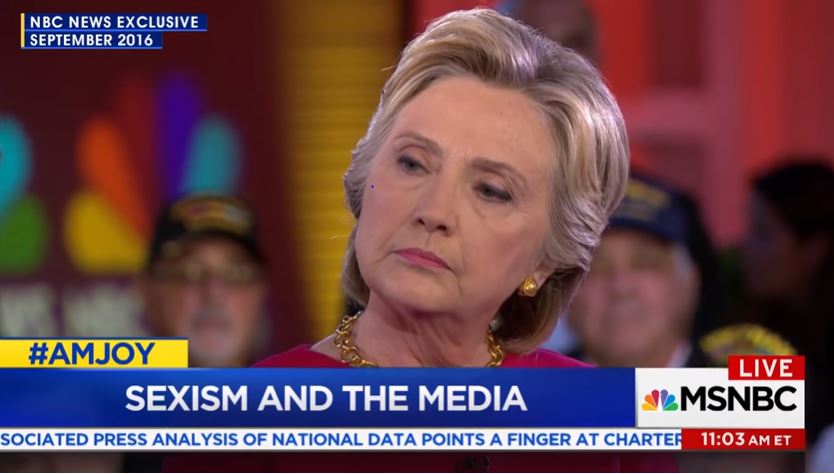 As a half-dozen Democratic women gear up for the chance to take on President Trump in 2020, New York Times reporter Maggie Astor made the front page Tuesday with “How Sexism Plays Out on the Campaign Trail – Voters Prefer ‘Likable’ Women, Reinforcing Gender Biases.” The text box on the jump page: “When Hillary Clinton ran for president, her detractors called her abrasive and shrill, words rarely used to describe men.”
As a half-dozen Democratic women gear up for the chance to take on President Trump in 2020, New York Times reporter Maggie Astor made the front page Tuesday with “How Sexism Plays Out on the Campaign Trail – Voters Prefer ‘Likable’ Women, Reinforcing Gender Biases.” The text box on the jump page: “When Hillary Clinton ran for president, her detractors called her abrasive and shrill, words rarely used to describe men.”
In the words of her detractors during the 2016 presidential race, Hillary Clinton was abrasive and shrill. She was aloof. She was unlikable.
It’s not a coincidence that some of these adjectives are now bubbling up in discussions of Senators Elizabeth Warren, Kirsten Gillibrand and Kamala Harris as they campaign for the 2020 Democratic nomination.
“Rarely used to describe men?” Astor should read her own paper’s campaign coverage. “Aloof” was the paper’s word for 2012 Republican candidate Mitt Romney, and the Times never stopped insisting Republican Sen. Ted Cruz was unlikable. Florida’s former Republican governor Rick Scott was “abrasive.” (All three, of course, are Republican men.) And coverage of Donald Trump himself has hardly been free of unflattering adjectives.
Oblivious Astor continued:
Few Americans acknowledge they would hesitate to vote for a woman for president -- but they don’t have to, according to researchers and experts on politics and women and extensive research on double standards in campaigns. Reluctance to support female candidates is apparent in the language that voters frequently use to describe men and women running for office; in the qualities that voters say they seek; and in the perceived flaws that voters say they are willing or unwilling to overlook in candidates.
The influence and impact of these stereotypes and double standards are about to play out in uncharted territory: a presidential race featuring six women running for the Democratic nomination, all vying to compete against President Trump, who has a history of making sexist comments.
....
Senator Amy Klobuchar of Minnesota is the latest woman to join the 2020 field, kicking off her campaign on Sunday. In the run-up to her announcement, she faced headlines about her well-known reputation in the Senate as a difficult boss. Whether she is held to a different standard than men remains to be seen: Male politicians pressure and berate staff members too, and, like Ms. Klobuchar’s Senate office, President Trump has had high employee turnover.
It's almost funny that the worrisome people pushing this theory are....reporters:
The very first question of Ms. Gillibrand’s campaign was about her likability. “A lot of people see you as pretty likable,” a reporter told her. Did she consider that a “selling point”?
Ms. Warren’s evaluation arrived with similar speed, in a Politico article that asked how she could “avoid a Clinton redux -- written off as too unlikable before her campaign gets off the ground.”
One of the most amorphous qualities candidates are judged on, likability is also deeply influenced by gender bias, researchers say. Voters look for it in men, too -- consider the “who would you rather have a beer with” question in campaigns -- but only in women, research shows, do they consider it non-negotiable.
Astor wound the topic back around to Hillary Clinton and her botched 2016 campaign.
Perhaps the most obvious way female candidates are judged differently is on their appearance: not only how “attractive” they are and how they dress, researchers say, but also their facial expressions, their body language and their voice. Accused in 2015 of “shouting” about gun violence, Mrs. Clinton responded: “First of all, I’m not shouting. It’s just when women talk, some people think we’re shouting.”
Ben Shapiro pointed out that Hillary Clinton could get shrill and it wasn’t sexist to point it out. The Times has often fought Clinton’s corner against “sexism,” as Times reporter Jodi Kantor did back during her first campaign.
Astor has a history of boosting liberals and their arguments in the Times.
PS: The Washington Free Beacon reports Sen. Gillibrand requested donations to her exploratory committee along with a screenshot of the New York Times article's headline.
"Outdated sexist tropes like the ones described on the front page of today’s New York Times still dominate the narrative around women candidates and campaigns like ours—but we’re going to shatter them," Gillibrand wrote in an email to supporters.




